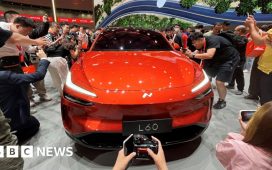A small tweak to a high-end car tax has revved up car industry groups who say the tax itself should be scrapped.
The tax in question is the luxury car tax, which applies to expensive imported cars at the point of sale.
Wednesday’s mid-year budget update revealed changes to the application of a luxury car tax discount available to fuel-efficient vehicles.
The discount is just one of several tax discounts or subsidies offered by federal, state and territory governments to promote electric vehicle uptake.
What’s changing?
From July 1, 2025, the definition of “fuel efficient” will be tightened, excluding some plug-in hybrid cars. That change will see consumers pay over $4,000 more when they purchase newly-excluded cars worth more than $77,000.
Treasurer Jim Chalmers said the change would “modernise” the definition of fuel efficiency, which has not been updated since 2008.
“This will incentivise more people getting genuinely low emissions vehicles, and that’s a good thing,” he said.
Mr Chalmers also emphasised the change was “very, very modest”, dismissing industry complaints as “a bit of an overreaction”.
In the context of the federal budget, it’s certainly small change — the tax raises just over $1 billion a year, or 0.2 per cent of the total tax take, and the changes will add only $60 million more in 2025–26.
Electric vehicle sweeteners
On top of the luxury car tax discount, the federal government last year introduced a fringe benefits tax exemption for electric vehicle purchases.
That change will allow employees to purchase electric vehicles tax-free through their employers. It applied only to vehicles that were not covered by the luxury car tax.
Then there’s an assortment of state and territory incentives. All jurisdictions offer discounts of some sort, including direct rebates, stamp duty discounts, zero-interest loans and car registration discounts.
Marion Terrill, transport program director at the Grattan Institute, said the “patchwork” of sweeteners was ineffective.
“If you’re thinking about this as a form of emissions abatement, it’s an expensive way to do it,” Ms Terrill said.
According to the Productivity Commission, the fringe benefits exemption costs $905 per tonne of carbon emissions abated.
Ms Terrill also argued efforts to boost demand for electric vehicles missed the point.
“There’s no evidence that there’s any shortage of demand. And why would there be? Although electric vehicles are more expensive to buy, they’re very cheap to run.”
Fuel efficiency standards
Ms Terrill said the bigger issue the sector faced was difficulties with supply.
“Unlike almost every other country around the world, we have failed to implement a fuel efficiency standard. And [as a result] the vehicle manufacturers themselves are quite upfront about saying Australia is a dumping ground for old models,” she said.
The Electric Vehicle Council, an advocacy body that tracks government, said both demand and supply supports were “necessary” to support electric vehicle uptake, although it acknowledged incentives should be “temporary”.
The council has called for a fuel efficiency standard, which would require manufacturers to meet specified fuel efficiency standards.
The federal government has committed to implementing a standard and has consulted on the details. It has not yet proposed a standard, but is expected to do so in the new year.
In September, electric vehicle company Tesla and the Climate Council accused car industry groups of trying to water down the standards.
Though supportive of a fuel efficiency standard, Ms Terrill said a single-minded focus on promoting electric vehicle updates risked overlooking other policy problems, such as congestion.
Because electric vehicles are cheaper to run than fuel cars, they can encourage owners to drive more often. A Victorian government levy on electric vehicle owners, which sought to charge them for road use, was deemed unconstitutional by the High Court in October.
“Carbon emissions are clearly one kind of negative impact of transport policy, but they’re certainly not the only one… if you end up with cities in gridlock, even if it’s not high-emissions gridlock, it’s still no good,” Ms Terrill said.









